- Home
- Henry James
The New York Stories of Henry James Page 2
The New York Stories of Henry James Read online
Page 2
On January 4, 1879, James wrote about the matter to his friend Grace Norton in Boston: “You may be interested to know that I hear my little ‘International Episode’ has given offence to various people of my acquaintance here. Don’t you wonder at it? So long as one serves up Americans for their entertainment it is all right—but hands off the sacred natives. They are really I think, thinner-skinned than we!” Two weeks later, James wrote to his mother: “It seems to me myself that I have been very delicate; but I shall keep off dangerous ground in the future.”
Later that year, when he published his book on Hawthorne, James discovered that Americans could also be thin-skinned. He was attacked by critics in both New York and Boston (“the clucking of a brood of prairie hens,” he called them), including his friend William Dean Howells, whose tone was milder but whose opinion was pointed. Howells wrote: “We foresee, without any powerful prophetic lens, that Mr. James will be in some quarters promptly attainted of high treason.” On the accusation that Hawthorne was provincial, Howells wrote: “If it is not provincial for an Englishman to be English, or a Frenchman French, then it is not so for an American to be American; and if Hawthorne was ‘exquisitely provincial’ one had better take one’s chances of universality with him than with any Londoner or Parisian of his time.” He sent James his review.
James was unrepentant. He replied:
I think it is extremely provincial for a Russian to be very Russian, a Portuguese very Portuguese; for the simple reason that certain national types are essentially and intrinsically provincial. I sympathise even less with your protest against the idea that it takes an old civilization to set a novelist in motion—a proposition that seems to me to be so true as to be a truism.
In that same letter James mentioned a forthcoming serialization in the Cornhill Magazine of “a poorish story in three numbers—a tale purely American, the writing of which made me feel acutely the want of the ‘paraphernalia.’”
The paraphernalia in question were, James had written earlier in the letter, the “manners, customs, usages, habits, forms, upon all these things matured and established that a novelist lives—they are the very stuff his work is made of.” The “poorish story” was “Washington Square.” While it is clear that he was being modest when he mentioned the book to Howells (and his general tendency in referring to his own work was to be self-deprecating), it still must seem that he underestimated the book. It is certainly his best short novel, and remains one of his best books. It was the first of his books to be serialized simultaneously on both sides of the Atlantic, thus offering him the freedom to devote a great deal of time to The Portrait of a Lady, his next project.
“Washington Square” tells the story or Dr. Sloper and his only daughter, Catherine, whom he considers dull. When Catherine falls in love with a penniless young man, her father becomes determined, in ways which are cold and cruel, that his daughter must not marry the interloper. James’s portrait of the vulnerable and sensitive and unassertive daughter is one of the most sustained and convincing of his career. The value of “Washington Square” also lies in the lack of “paraphernalia,” thus forcing James to intensify the psychology, to draw the father and daughter with greater subtlety and care because he, at the apex of his social power in London, did not know enough about the city and the society in which he had set the novel. He knew about the interior of the houses where he had been a small boy; he could write about familiar rooms; but he had not grown up in that world enough to know its wider personality.
He placed the events of “Washington Square” in the very years when he and his family were living in the city; he made his grandmother’s house become the house of Dr. Sloper, as a year later he would make his other grandmother’s house become Isabel Archer’s house in Albany. The original story was told to him by Fanny Kemble, whose brother had jilted an heiress when he discovered that her father intended to disinherit her. James moved this story to his own lost territory, to the site which belonged now merely to his dreams, to the old New York, whose contours he had barely made out before he was removed from it. In chapter two of the book he inserted a passage about Washington Square and its environs which strikes the reader as strange, almost clumsy, and unthinkable for a novelist who is about to write The Portrait of a Lady.
“I know not,” he wrote of the area around the square,
whether it is owing to the tenderness of early associations, but this portion of New York appears to many persons the most delectable. It has a kind of established repose which is not of frequent occurrence in other quarters of the long, shrill city; it has a riper, richer, more honourable look than any of the upper ramifications of the great longitudinal thoroughfare—the look of having had something of a social history... It was here that your grandmother lived, in venerable solitude, and dispensed a hospitality which commended itself alike to the infant imagination and the infant palate; it was here that you took your first walks abroad, following the nursery-maid with unequal step... It was here, finally, that your first school, kept by a broad-bosomed, broad-based old lady with a ferule, who was always having tea in a blue cup, with a saucer that didn’t match, enlarged the circle both of your observations and your sensations. It was here, at any rate, that my heroine spent many years of her life; which is my excuse for this topographical parenthesis.
This may well be the excuse, but it is hardly the reason. The reason is that, a quarter of a century after it had been lost to him, James was prepared to disrupt the sacred seamlessness of his fiction to evoke this square as belonging to his memory, his primary sense of himself which could be brought back now only in words. The need was so pressing and urgent that he would allow such a paragraph to remain; had it been about another place, he would surely have removed it. He was claiming Washington Square for himself. It was here also, soon afterwards, that he began to evoke the next generation, who were too ready to eschew social history for the blight, as James saw it, of newness.
Dr. Sloper’s niece, for example, is about to marry Arthur Townsend, who speaks about his new house:
It’s only for three or four years. At the end of three or four years we’ll move. That’s the way to live in New York—to move every three or four years. Then you always get the last thing. It’s because the city’s growing so quick—you’ve got to keep up with it. It’s going straight up town—that’s where New York’s going...I guess we’ll move up little by little; when we get tired of one street we’ll go higher. So you see we’ll always have a new house; it’s a great advantage to have a new house; you get all the latest improvements. They invent everything all over again about every five years, and it’s a great thing to keep up with the new things.
It is easy to feel James’s rage and exasperation at the new ethos of easy and quick change which has eaten up his city of old values, destroyed the few buildings and streets with many rich old associations for him. Like the passage quoted above about Washington Square itself, however, this long speech by the young man seems forced and makes its point rather too heavily. These two passages stand out in a novel which is otherwise compact and tightly constructed. They are part of James’s deeply irrational response to the New York he had known and what had replaced it; his emotions about the city, as about no other place, moved at times slowly and strangely out of his control.
Three years later, after the death of his parents and a return to the United States, James wrote another story set in New York, “The Impressions of a Cousin,” one of his slackest and weakest stories but interesting nonetheless for the further light it shines on his attitude to New York. The story opens as the narrator wonders how she can inhabit Fifty-third Street:
When I turn into it from Fifth Avenue the vista seems too hideous: the narrow, impersonal houses, with the dry, hard tone of their brown-stone, a surface as uninteresting as that of sandpaper; their steep stiff stoops, giving you such a climb to the door; their lumpish balustrades, porticoes, and cornices, turned out by the hundred and adorned with heavy excrescence
s—such an eruption of ornament and such a poverty of effect!
The narrator is a painter, returned from Italy, who remarks in the early pages that there is nothing to sketch in the city, not even the people. “What people? the people in the Fifth Avenue? They are even less pictorial than their houses. I don’t perceive that those in the Sixth are any better, or those in the Fourth and Third, or in the Seventh and Eighth. Good heavens! What a nomenclature! The city of New York is like a tall sum in addition, and the streets are like columns of figures.”
Later, she will see the stoops “as ugly as a bad dream,” as earlier she has seen the sky over New York as seeming “part of the world at large; in Europe it’s part of the particular place.” This echoes James’s assertion in his Hawthorne book of four years earlier that in the United States, in Hawthorne’s day, “there were no great things to look at (save forests and rivers).”
For the next twenty years and more, as he wrote increasingly about England and the English, James remained silent on the subject of New York. His bad dreams of the city seemed to be over. He had other places, such as Paris and Rome and Florence, to remember and note as they changed. But nothing in James’s most complex personality was ever that simple. The city of New York, in all its unresolved power, remained like an undertow in his consciousness for all the years. In 1906, in his book The American Scene, he devoted three chapters to the city, having kept in reserve, during his long exile, a body of adjectives which he now heaped down on the teeming metropolis like a plague of locusts.
James began by disliking New York Harbor: “The shores are low and for the most part depressingly furnished and prosaically peopled; the islands, though numerous, have not a grace to exhibit.” He admits to “the beauty of light and air,” which is like admitting that the United States has forests and rivers to look at. Soon, however, James, using a peculiarly fervid tone, was writing about power, about which he was both uneasy and oddly thrilled:
The aspect of power...is indescribable; it is the power of the most extravagant of cities, rejoicing as with the voice of the morning, in its might, its fortune, its unsurpassable conditions, and imparting to every object and element, to the motion and expression of every floating, hurrying, panting thing, to the throb of ferries and tugs...something of its sharp free accent.
He writes about “the bigness and bravery and insolence, especially, of everything that rushed and shrieked.”
The city’s skyscrapers struck him as
impudently new and still more impudently “novel”—this in common with so many other terrible things in America —and they are triumphant payers of dividends... Crowned not only with no history, but with no credible possibility of time for history, and consecrated by no uses save the commercial at any cost, they are simply the most piercing notes in the concert of the expensively provisional into which your supreme sense of New York resolves itself.
It gets worse, as James, visiting the business quarter, notes “the consummate monotonous commonness...of the pushing male crowd, moving in its dense mass.” He is appalled by the disappearance of buildings and the dwarfing of others. He is, he admits, “haunted” by a “sense of dispossession.” He revisits his old city: “The precious stretch of space between Washington Square and Fourteenth Street had a value, had even a charm, for the revisiting spirit—a mild and melancholy glamour which I am conscious of the difficulty of ‘rendering’ for new and heedless generations.” The demolition of his birthplace at Washington Place had the effect, James wrote, “of having amputated of half my history.” He realizes that the building which could have sported a tablet announcing the author’s very birthplace had been destroyed.
As he rails against the city, James finds astonishing images for the levels of distress he detects in the natives:
Free existence and good manners, in New York, are too much brought down to a bare rigour of marginal relations to the endless electric coil, the monstrous chain that winds around the general neck and body, the general middle and legs, very much as the boa-constrictor winds around the group of the Laocoon. It struck me that when these folds are tightened in the terrible stricture of the snow-smothered months of the year, the New York predicament leaves far behind the anguish represented in the Vatican figures.”
Nothing pleases him. “This original sin,” he writes,
of the longitudinal avenues perpetually, yet meanly intersected, and of the organised sacrifice of the indicated alternative, the great perspectives from East to West, might still have earned forgiveness by some occasional departure from its pettifogging consistency. But, thank to this consistency, the city is, of all great cities, the least endowed with any blest item of stately square or goodly garden, with any happy accident or surprise, any fortunate nook or casual corner, any deviation, in fine, into the liberal or the charming.
Even the city’s energy appalls him: “The very sign of its energy is that it doesn’t believe in itself; it fails to succeed, even at a cost of millions, in persuading you that it does.”
James’s horror of the new arrivals in the city and his use of animal imagery to evoke them make for some of the most uncomfortable reading in his entire opus. The immigrant in New York “resembles for the time the dog who sniffs round the freshly-acquired bone, giving it a push and a lick, betraying a sense of its possibilities, but not—and quite as from a positive deep tremor of consciousness—directly attacking it.” Of the Jewish population, he wrote: “There are small strange animals, known to natural history, snakes or worms I believe, who, when cut into pieces, wriggle away contentedly and live in the snippet as completely as in the whole. So the denizens of the New York Ghetto, heaped as thick as the splinters on the table of a glass-blower, had each, like the fine glass particle, his or her individual share of the whole hard glitter or Israel.” The fire escapes, “omnipresent in the ‘poor’ regions” of the city, remind James “of the speciously organised cage for the nimbler class of animals in some great zoological garden. This general analogy is irresistible—it seems to offer, in each district, a little world of bars and perches and swings for human squirrels and monkeys.” He watched, from a window in the Ghetto, on “a swarming little square in which an ant-like population darted to and fro.”
It is hard to be precise about what exactly is biting Henry James as he wanders the streets of New York, “this terrible town,” as he puts it, hating the voices and the accents he heard in the cafés, “the torture rooms of the living idiom,” disliking even Central Park, comparing it “to an actress in a company destitute, through an epidemic or some other stress, of all feminine talent; so that she assumes on successive nights the most dissimilar parts and ranges in the course of a week from the tragedy queen to the singing chambermaid.”
It is as though something has been stolen from James, as indeed it has, and it is not something ordinary. For certain writers, both places long abandoned and experiences that might just as well have been forgotten continue to exist in the present tense. They can be conjured up at will, and sometimes they come unwilled. They live lives of their own in the mind. They are like rooms whose electric lights cannot be dimmed or switched off. For James, the New York of 1848 to 1855 was such a place and his experiences there, so happy with the innocence of prepuberty and full of ease, did not fade in his memory, as they must have done in his brother’s memory. They remained living presences. He was moving now fifty years later in a city which tried, in name of novelty, to prevent him re-inhabiting his lighted rooms. He was not simply in the new city while remembering the old. The old city had never ended for him; it lived as an aspect of the imperative of his genius. Now the lights in his rooms were flickering madly, almost blinding him. To protect himself, he heaped insult upon insult on New York.
For a writer, the blurring of time present and time past is a way of freeing the imagination but it has also a way of making the personality both troubled and willful. What he saw in 1905 in New York caused James to use imagery wildly disproportionate to his experience, bu
t apt for the battle going on within him between a past which clung to him and the terrible novelty of modernity. Writers die when they grow up; New York that year was asking James for too much.
It should be possible, also, to argue that the case was much simpler, that James found more decent, human, and civilized values in the city of his childhood and genuinely disliked the city he found in 1905, and expressed himself robustly on the matter, having done so in a number of stories also. But one of the last stories he set in New York, and one of his last pieces of fiction, tends to favor the opposite argument, that there was something unresolved and haunting in James’s dislike of New York and in his fear of it. This story is called “The Jolly Corner.”

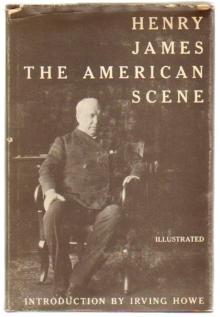 The American
The American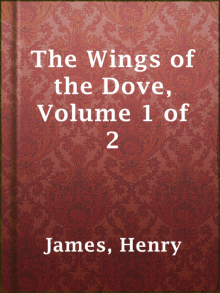 The Wings of the Dove, Volume 1 of 2
The Wings of the Dove, Volume 1 of 2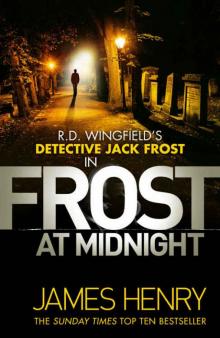 Frost at Midnight
Frost at Midnight Morning Frost
Morning Frost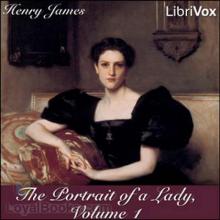 The Portrait of a Lady — Volume 1
The Portrait of a Lady — Volume 1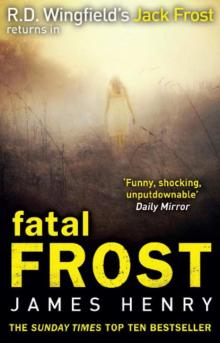 Fatal Frost
Fatal Frost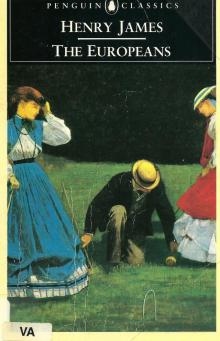 The Europeans
The Europeans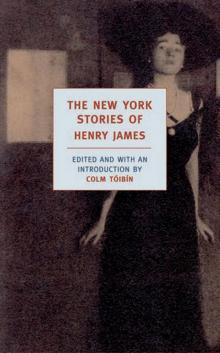 The New York Stories of Henry James
The New York Stories of Henry James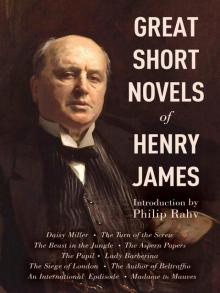 Great Short Novels of Henry James
Great Short Novels of Henry James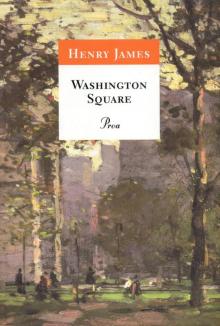 Washington Square
Washington Square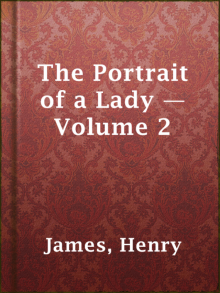 The Portrait of a Lady — Volume 2
The Portrait of a Lady — Volume 2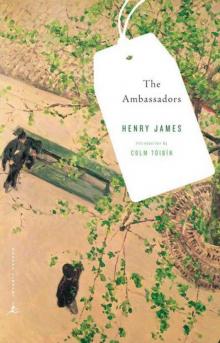 The Ambassadors
The Ambassadors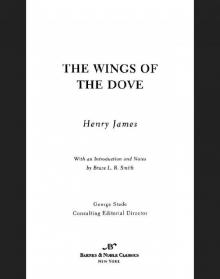 The Wings of the Dove
The Wings of the Dove The Princess Casamassima (Classics)
The Princess Casamassima (Classics)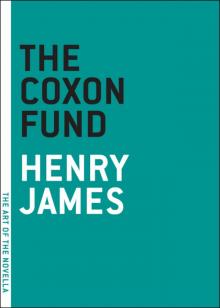 The Coxon Fund
The Coxon Fund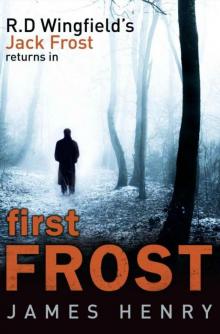 First Frost
First Frost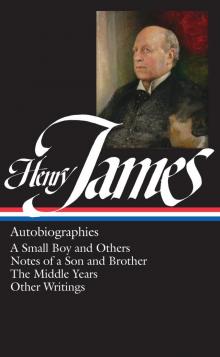 Henry James
Henry James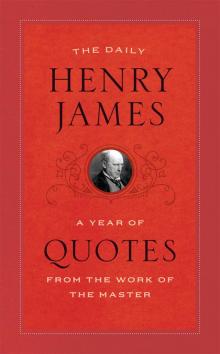 The Daily Henry James
The Daily Henry James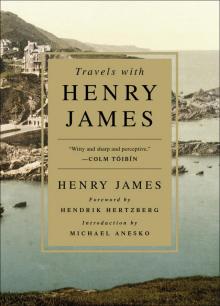 Travels With Henry James
Travels With Henry James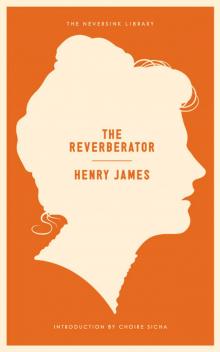 The Reverberator: A Novel
The Reverberator: A Novel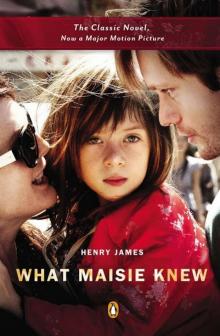 What Maisie Knew (Henry James Collection)
What Maisie Knew (Henry James Collection)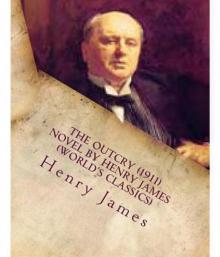 The Outcry
The Outcry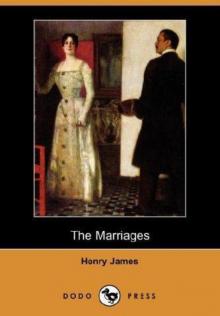 The Marriages
The Marriages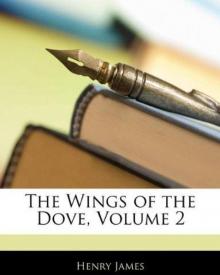 The Wings of the Dove, Volume 2
The Wings of the Dove, Volume 2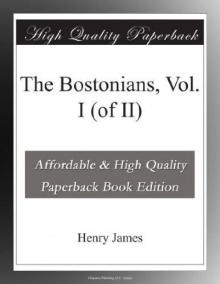 The Bostonians, Vol. I
The Bostonians, Vol. I The Outcry: -1911
The Outcry: -1911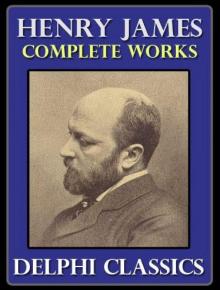 The Complete Works of Henry James
The Complete Works of Henry James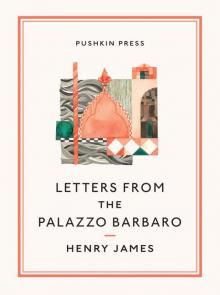 Letters from the Palazzo Barbaro
Letters from the Palazzo Barbaro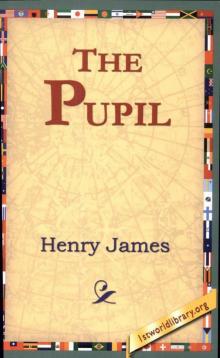 The Pupil
The Pupil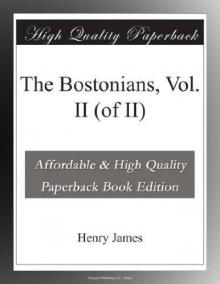 The Bostonians, Vol. II
The Bostonians, Vol. II Pandora
Pandora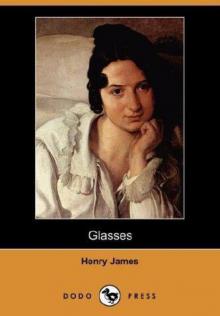 Glasses
Glasses The Princess Casamassima
The Princess Casamassima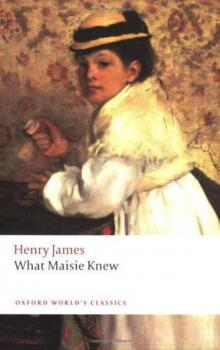 What Maisie Knew
What Maisie Knew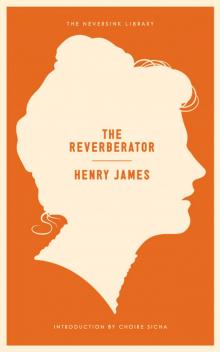 The Reverberator
The Reverberator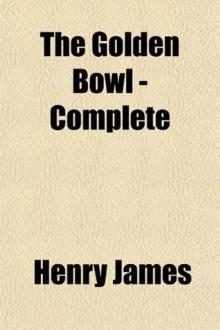 The Golden Bowl - Complete
The Golden Bowl - Complete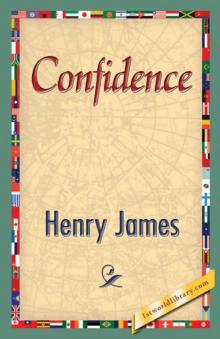 Confidence
Confidence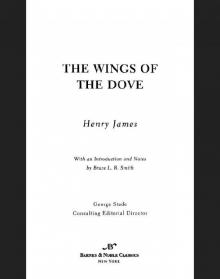 Wings of the Dove (Barnes & Noble Classics Series)
Wings of the Dove (Barnes & Noble Classics Series)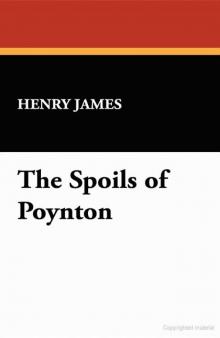 The Spoils of Poynton
The Spoils of Poynton